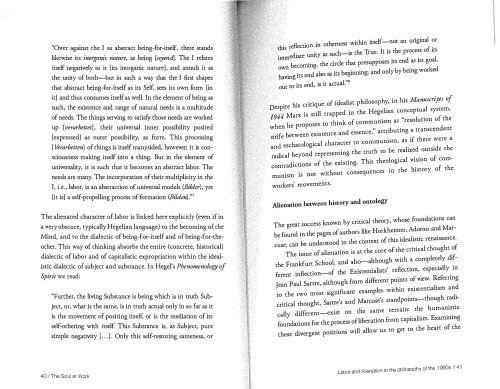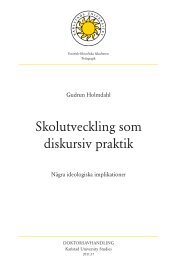Franco ''Bifo'' Berardi - The Soul at Work From Alienation to Autonomy
Franco ''Bifo'' Berardi - The Soul at Work From Alienation to Autonomy
Franco ''Bifo'' Berardi - The Soul at Work From Alienation to Autonomy
- No tags were found...
Create successful ePaper yourself
Turn your PDF publications into a flip-book with our unique Google optimized e-Paper software.
"Over against the I as absttact being-for-itself, there standslikewise its inorganic n<strong>at</strong>ure, as being [seyena']. <strong>The</strong> I rel<strong>at</strong>esitself neg<strong>at</strong>ively <strong>to</strong> it (its inorganic n<strong>at</strong>ure], and annuls it asthe unity of both-but in such a way th<strong>at</strong> the I first shapesth<strong>at</strong> abstract being-for-itself as its Self, sees its Own form [init] and thus consumes itself as well. In the element of being assuch, the existence and range of n<strong>at</strong>ural needs is a multitudeof needs. <strong>The</strong> things serving ro s<strong>at</strong>isfy those needs are workedup [verarbeitet] , their universal inner possibility posited[expressed] as Outer possibility, as form. This processing[Verarbeiten] of things is itself manysided, however; it is consciousnessmaking itself in<strong>to</strong> a thing. But in the element ofuniversality, it is such th<strong>at</strong> it becomes an abstract labor. <strong>The</strong>needs are many. <strong>The</strong> incorpor<strong>at</strong>ion of their multiplicity in the1, i.e., labor, is an abstraction of universal models (Bilder), yet[it is] a self-propelling process of form<strong>at</strong>ion (Bilden)."7<strong>The</strong> alien<strong>at</strong>ed character of labor is linked here explicitly (even if ina very obscure, typically Hegelian language) <strong>to</strong> the becoming of theMind, and <strong>to</strong> the dialectic of being-for-itself and of being-for-theother.This way of thinking absorbs the entire (concrete, his<strong>to</strong>rical)dialectic oflabor and of capiralisric expropri<strong>at</strong>ion wirhin the idealisricdialectic of subject and substance. In Hegel's Phenomenology ofSpirit we read:"Further, the living Subsrance is being which is in truth Subject,or, wh<strong>at</strong> is the same, is in truth actual only in so far as itis the movement of positing itself, or is the medi<strong>at</strong>ion of itsself-othering with itself This Substance is, as Subject, puresimple neg<strong>at</strong>ivity [ .. . J. Only this self-resroring sameness, Otthis reflection in otherness within itself-not an original orimmedi<strong>at</strong>e unity as such-is the True. It is the process of itsown becoming, the circle th<strong>at</strong> presupposes its end as its goal,having its end also as its beginning; and only by being workedout <strong>to</strong> its end, is it actual."sDespite his critique of idealist philosophy, in his Manuscripts of1844 Marx is still trapped in the Hegelian conceptual system,when he proposes <strong>to</strong> think of communism as "resolution of thestrife between existence and essence/) <strong>at</strong>tributing a transcendentand esch<strong>at</strong>ological character <strong>to</strong> communism, as if there were aradical beyond representing the truth <strong>to</strong> be realized outside thecontradictions of the existing. This theological vision of communismis not without consequences in the his<strong>to</strong>ry of theworkers) movements.Alien<strong>at</strong>ion between his<strong>to</strong>ry and on<strong>to</strong>logy<strong>The</strong> gre<strong>at</strong> success known by critical theory, whose found<strong>at</strong>ions canbe found in the pages of authors like Horkheimer, Adorno and Marcuse,can be unders<strong>to</strong>od in the context of this idealistic renaissance.<strong>The</strong> issue of alien<strong>at</strong>ion is <strong>at</strong> the core of the critical thought ofthe Frankfurt School, and also--although with a completely differentinflection-of the Existentialists' reflection, especially inJean Paul Same, although from different points of view. Referring<strong>to</strong> the twO most significant examples within existentialism andcritical thought, Same's and Marcuse's standpoints-though radicallydifferent-exist on the same terrain: the humanisticfound<strong>at</strong>ions for the process of liber<strong>at</strong>ion from capitalism. Examiningthese divergent positions will allow us <strong>to</strong> get <strong>to</strong> the heart of the40 I <strong>The</strong> <strong>Soul</strong> <strong>at</strong> Won






